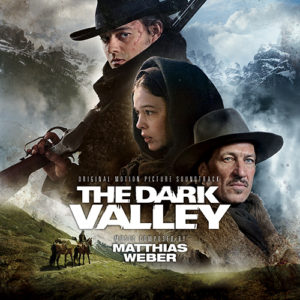The Dark Valley is a 2014 Austrian-German gothic western film directed by Andreas Prochaska. It was selected as the Austrian entry for the Best Foreign Language Film at the 87th Academy Awards, but was not nominated.
A solitary stranger appears in a mountain village high in the Alps, stirring unease among the locals as he frigid winds of winter blow in. Subsequently taken in by the local patriarch, the mysterious newcomer becomes the subject of grim speculation after two of his host’s sons perish under mysterious circumstances.
 Based on a 2010 best-seller by Thomas Willmann, The Dark Valley is a visually sumptuous spectacle with solid action and horror elements.
Based on a 2010 best-seller by Thomas Willmann, The Dark Valley is a visually sumptuous spectacle with solid action and horror elements.
Riley plays a Clint-style role as a lone horseman who rides into the village just as winter is approaching. Undeterred by his extremely frosty welcome, the tight-lipped stranger finds long-term lodging with narrator Luzi (Paula Beer) and her widowed mother (Carmen Gratl). In return for the room at the inn, Luzi asks Greider for a photo of her and her fiance Lukas (Thomas Schubert), before their wedding. Luzi tries to warn Greider about how the town may be too tough for him, before he finds out firsthand.
 Raised in America but fluent in German, Greider is returning to his maternal homeland, apparently with plans to photograph the locals and landscape with his flashy new daguerreotype camera. In reality, the American interloper has vengeance in mind against old man Brenner (Hans-Michael Rehberg), the godfather of a sadistic clan that has imposed a brutal feudal rule over the village for decades, routinely claiming droit du seigneur over newlywed brides. When the deep snows of winter blow in, the Brenners start dying in increasingly grisly ways as Greider declares a one-man guerrilla war against them.
Raised in America but fluent in German, Greider is returning to his maternal homeland, apparently with plans to photograph the locals and landscape with his flashy new daguerreotype camera. In reality, the American interloper has vengeance in mind against old man Brenner (Hans-Michael Rehberg), the godfather of a sadistic clan that has imposed a brutal feudal rule over the village for decades, routinely claiming droit du seigneur over newlywed brides. When the deep snows of winter blow in, the Brenners start dying in increasingly grisly ways as Greider declares a one-man guerrilla war against them.
The Hollywood western ancestry of The Dark Valley borrows across the spectrum from High Noon to Unforgiven, not to mention strong overtones of High Plains Drifter, that cultish early entry in Clint Eastwood’s directing canon. Prochaska and his cinematographer Thomas Kiennast deploy a starkly beautiful palette worthy of a Dutch Master, framing these snowy mountain vistas in dark wood and earth tones that almost appear monochrome at times. Matthias Weber’s doomy orchestral score helps sustain the mood of creeping dread and gothic melodrama.





